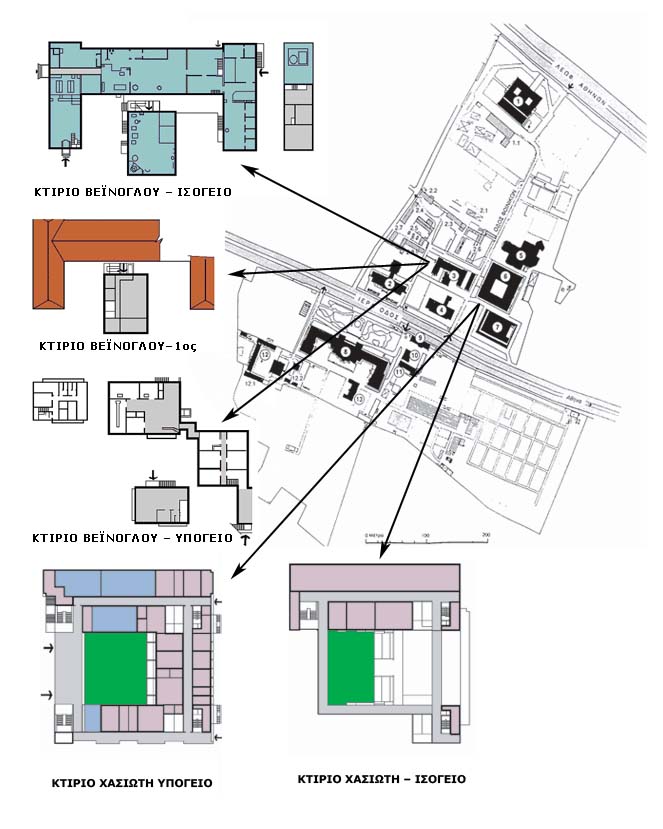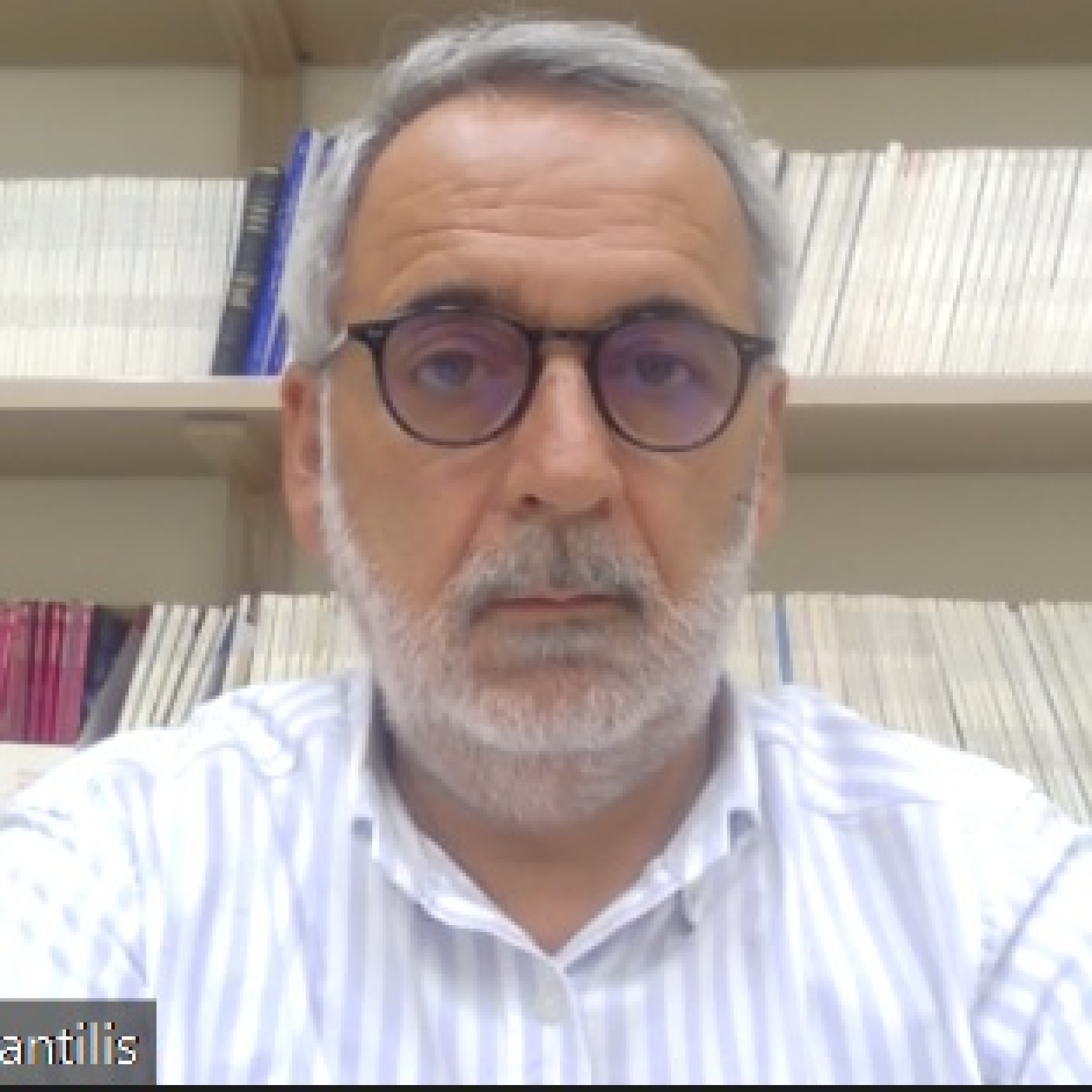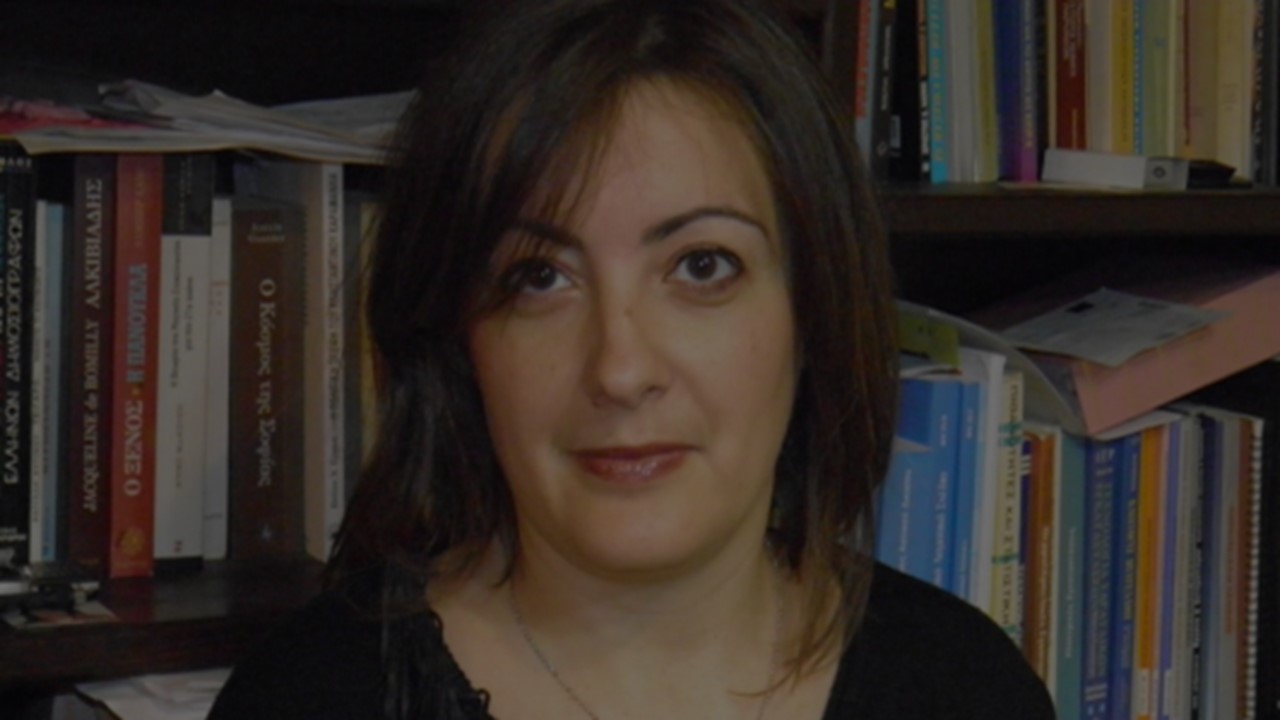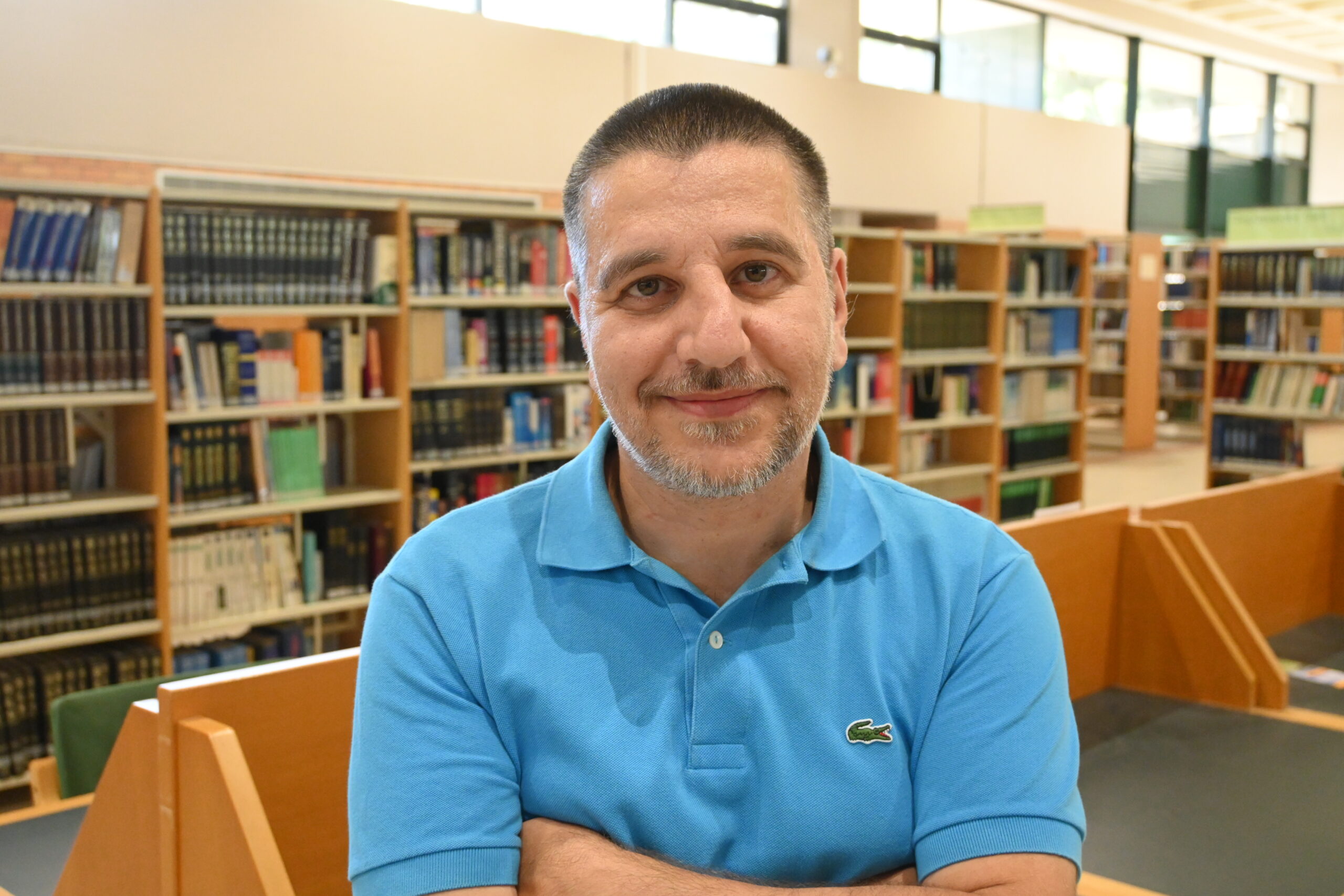Overview
Το Τμήμα Επιστήμης Τροφίμων και Διατροφής του Ανθρώπου - ΕΤΔΑ (Μετονομασθέν Τμήμα Επιστήμης και Τεχνολογίας Τροφίμων, ΠΔ 80/27/5/13, ΦΕΚ Α119 28/5/13) προσφέρει στους φοιτητές του το επιστημονικό υπόβαθρο για την ορθολογική αντιμετώπιση επιστημονικών και τεχνολογικών θεμάτων που σχετίζονται με τον τομέα των τροφίμων. Παράλληλα, προάγει την υπάρχουσα γνώση στην Επιστήμη των Τροφίμων και στη Διατροφή του Ανθρώπου, συμμετέχοντας σε ερευνητικά και αναπτυξιακά προγράμματα, που διεξάγονται σε συνεργασία με άλλα πανεπιστημιακά και ερευνητικά ιδρύματα της Ελλάδας και του εξωτερικού καθώς και με τα τμήματα έρευνας και ανάπτυξης μικρών και μεγάλων βιομηχανιών τροφίμων της χώρας μας.
Βασικοί Στόχοι του Τμήματος ΕΤΔΑ:
- Η ολοκληρωμένη εκπαίδευση νέων επιστημόνων με τις απαραίτητες γνώσεις θετικών, τεχνολογικών και οικονομικών επιστημών και η προετοιμασία τους για τη στελέχωση των βιομηχανιών τροφίμων αλλά και φορέων του ιδιωτικού και δημόσιου τομέα, όπως ερευνητικά εργαστήρια, μικροβιολογικά εργαστήρια, εργαστήρια ποιοτικού ελέγχου, εταιρείες προμήθειας πρώτων υλών για τη βιομηχανία, ελεγκτικές/ρυθμιστικές αρχές, εταιρείες παροχής συμβουλευτικών υπηρεσιών για συστήματα διαχείρισης της ασφάλειας τροφίμων και ποτών.
- Η ανάπτυξη της Επιστήμης και Τεχνολογίας Τροφίμων μέσω της επιστημονικής έρευνας, καθώς και η δημιουργία νέων ερευνητών.
- Η παροχή επιστημονικών γνώσεων στη Βιομηχανία Τροφίμων, στο πλαίσιο μιας διαρκούς συνεργασίας μεταξύ του Πανεπιστημίου και της Επιχειρηματικής Κοινότητας.
Πρόεδρος: Ιωάννα Μαντάλα
Αναπληρωτής Πρόεδρος: Σεραφείμ Παπανικολάου
Διευθυντές Εργαστηρίων
- Εργαστήριο Γαλακτοκομίας: Γκόλφω Μοάτσου
- Εργαστήριο Γενικής Χημείας: Πέτρος Ταραντίλης
- Εργαστήριο Μηχανικής και Επεξεργασίας Τροφίμων: Ιωάννα Μαντάλα
- Εργαστήριο Μικροβιολογίας & Βιοτεχνολογίας Τροφίμων: Σεραφείμ Παπανικολάου
- Εργαστήριο Οινολογίας και Αλκοολούχων Ποτών: Γεώργιος Κοτσερίδης
- Εργαστήριο Ποιοτικού Ελέγχου & Υγιεινής Τροφίμων και Ποτών: Παναγιώτης Σκανδάμης
- Εργαστήριο Χημείας & Ανάλυσης Τροφίμων: Μαρία Καψοκεφάλου
- Εργαστήριο Διαιτολογίας και Ποιότητας Ζωής: Αιμιλία Παπακωνσταντίνου
Γραμματεία Προπτυχιακών Φοιτητών
Αναπληρώτρια Προϊσταμένη
Σοφία Περηφάνου (ΠΕ Διοικητικού-Οικονομικού)
Τηλ.: 210 529 4664, e-mail: ett@aua.gr
Φοιτητικά Θέματα
Δαβυτίδου-Βενέτη Ευδοκία
Τηλ.: 210 529 4682
Γραμματεία Μεταπρυχιακών Φοιτητών
Δώρα ΚΟΜΜΑΤΑ
Τηλ.: 210 529 4677, email: pms_etda@aua.gr
Η Γραμματεία και τα Εργαστήρια του Τμήματος Επιστήμης Τροφίμων και Διατροφής του Ανθρώπου στεγάζονται στα ακόλουθα κτίρια:
Υπηρεσία / Εργαστήριο Κτίριο
Γραμματεία Τμήματος, Χασιώτη (ισόγειο)
Μηχανικής και Επεξεργασίας Τροφίμων, Χασιώτη (ισόγειο & υπόγειο)
Μικροβιολογίας και Βιοτεχνολογίας Τροφίμων, Χασιώτη (ισόγειο & υπόγειο)
Ποιοτικού Ελέγχου και Υγιεινής Τροφίμων, Χασιώτη (ισόγειο & υπόγειο)
Χημείας και Ανάλυσης Τροφίμων, Χασιώτη (ισόγειο & υπόγειο) - Παλαιάς Επιτροπής Γάλακτος
Οινολογίας και Αλκοολούχων Ποτών, Χασιώτη (υπόγειο)
Γενικής Χημείας ,Πτέρυγα Κουγέα (κεντρικό κτίριο)
Γαλακτοκομίας, Βεϊνόγλου
Διαιτολογίας και Ποιότητας Ζωής, πρώην κτίριο Εθνικής Επιτροπής Γάλακτος Ελλάδος & νέο κτίριο Κτηνοτροφίας

Quality Assurance
Η ΟΜ.Ε.Α. συγκροτείται στις Ακαδημαϊκές Μονάδες (Σχολές ή Τμήματα) με απόφαση της Γενικής Συνέλευσης από μέλη ΔΕΠ ή ΕΠ των βαθμίδων του Καθηγητή ή Αναπληρωτή Καθηγητή με διεθνώς αναγνωρισμένο επιστημονικό έργο και κατά προτίμηση με εμπειρία σε διαδικασίες διασφάλισης της ποιότητας. Στην ΟΜ.Ε.Α. συμμετέχει επίσης ένας εκπρόσωπος των φοιτητών ή σπουδαστών που υποδεικνύεται από τον αρμόδιο φορέα εκπροσώπησής τους (Ν. 3374/2005, Άρθρο 5 §2). Η θητεία της ΟΜ.Ε.Α. ισχύει για τη διάρκεια μιας περιόδου Εσωτερικής και Εξωτερικής Αξιολόγησης και λήγει με την ολοκλήρωση της διαδικασίας Εξωτερικής Αξιολόγησης.
Ο ρόλος της ΟΜ.Ε.Α. είναι επιτελικός, συντονιστικός αλλά και εκτελεστικός:
- έχει την ευθύνη της διεξαγωγής, σε συνεργασία με την οικείαΜΟ.ΔΙ.Π., της Διαδικασίας Εσωτερικής Αξιολόγησης στην ακαδημαϊκή μονάδα
- παρακολουθεί τη συμπλήρωση τωνΑπογραφικών Δελτίων και Ερωτηματολογίων και ενημερώνει τα όργανα και τα μέλη της ακαδημαϊκής μονάδας για τις απαντήσεις
- συγκεντρώνει όλα τα απαραίτητα για την αξιολόγηση στοιχεία και με βάση αυτά
- συντάσσει τηνΈκθεση Εσωτερικής Αξιολόγησης (Αυτο-αξιολόγησης) της ακαδημαϊκής Μονάδας, την οποία διαβιβάζει στη ΜΟ.ΔΙ.Π. και μέσω αυτής στην Α.ΔΙ.Π.
- συνεργάζεται με την Α.ΔΙ.Π. για την οργάνωση και πραγματοποίηση τηςΕξωτερικής Αξιολόγησης
Το έργο της η ΟΜ.Ε.Α. επικουρείται από όλα τα μέλη της Ακαδημαϊκής Μονάδας: επιδιώκει τη συμμετοχή όλων, αλλά και λαμβάνει υπόψη τις απόψεις τους.
Η ΟΜ.Ε.Α. καθορίζει και κοινοποιεί εξαρχής τους τρόπους με τους οποίους διασφαλίζεται η διαφάνεια της εσωτερικής αξιολόγησης (π.χ. με ποιους τρόπους ακούγονται και λαμβάνονται υπόψη όλες οι απόψεις, τρόπους και μέσα επικοινωνίας όλων των ενδιαφερομένων, τήρηση αρχείου επικοινωνίας, διαδικασίες λήψης αποφάσεων, ενθάρρυνση πρωτοβουλιών, αντιμετώπιση διαφωνιών κλπ.).
Υπογραμμίζεται η σημασία του καλού και έγκαιρου προγραμματισμού, της τυποποίησης των διαδικασιών και της περιοδικής ενημέρωσης όλων των συμμετεχόντων.
Η ΟΜ.Ε.Α. του Τμήματος Επιστήμης Τροφίμων και Διατροφής του Ανθρώπου αποτελείται – σύμφωνα με Απόφαση της Συνέλευσης (22, 600η/15.03.2023) - από τους:
- ΜΑΝΤΑΛΑ Ιωάννα, Καθηγήτρια
- ΚΑΨΟΚΕΦΑΛΟΥ Μαρία, Καθηγήτρια
- ΚΟΤΣΕΡΙΔΗΣ Γεώργιος, Καθηγητής
- ΜΟΑΤΣΟΥ Γκόλφω, Καθηγήτρια
- ΠΑΝΑΓΟΥ Ευστάθιος, Καθηγητής
- ΠΑΠΠΑΣ Χρήστος, Καθηγητής
- ΣΚΑΝΔΑΜΗΣ Παναγιώτης, Καθηγητής
- ΕΥΑΓΓΕΛΙΟΥ Βασιλική, Αναπληρώτρια Καθηγήτρια
Quality Assurance Policy
Το Τμήμα Επιστήμης Τροφίμων και Διατροφής του Ανθρώπου (ΕΤΔΑ) της Σχολής Επιστημών Τροφίμων και Διατροφής (ΕΤΔ) του Γεωπονικού Πανεπιστημίου Αθηνών (ΓΠΑ) είναι προσηλωμένο στην παροχή υψηλής ποιότητας ανώτατης εκπαίδευσης στους φοιτητές του στα επιστημονικά πεδία της Επιστήμης Τροφίμων και Διατροφής του Ανθρώπου, αλλά και στην προσπάθεια ανάπτυξης ενός δημιουργικού περιβάλλοντος έρευνας και εργασίας για το προσωπικό του. Η δέσμευση των μελών ΔΕΠ, ΕΔΙΠ, ΕΤΕΠ και διοικητικού προσωπικού του Τμήματος για τη συνεχή βελτίωση του διδακτικού και ερευνητικού έργου και των παρεχόμενων υπηρεσιών αποτελεί στρατηγική επιλογή διοίκησης και ευθύνης.
Το όραμα του Τμήματος είναι να συνεχίσει να υπηρετεί στόχους εκπαιδευτικούς, ερευνητικούς, πολιτιστικούς και ευρύτερα κοινωνικούς, με προσήλωση στις αρχές της επιστημονικής δεοντολογίας, της λογοδοσίας, της βιώσιμης ανάπτυξης και της κοινωνικής συνοχής.
Το Τμήμα έχει υιοθετήσει και εφαρμόζει συγκεκριμένη πολιτική ποιότητας, η οποία είναι απόλυτα συνδεδεμένη με το νομικό και κανονιστικό πλαίσιο που διέπει τη λειτουργία του ΓΠΑ.
Μέσα από την υιοθέτηση, ανασκόπηση, επανασχεδιασμό και επαναπροσδιορισμό της πολιτικής ποιότητας, το Τμήμα δεσμεύεται στο να επιτύχει ακόμα υψηλότερες επιδόσεις. Με αυτή τη στρατηγική θα αναδείξει αξίες, πρότυπα και παραδείγματα, ώστε να συμβάλλει στην επιδίωξη ολόκληρου του ΓΠΑ για διδακτικά και ερευνητικά αποτελέσματα υψηλής ποιότητας και να βοηθηθεί η χώρα προς μια σταθερή πορεία γνήσιας ανάπτυξης.
Το Τμήμα ΕΤΔΑ της Σχολής ΕΤΔ του ΓΠΑ έχει αναπτύξει και εφαρμόζει συγκεκριμένη επίσημη πολιτική Διασφάλισης Ποιότητας, η οποία αποτελεί μέρος της στρατηγικής του Ιδρύματος.
Στην ανάπτυξη και εφαρμογή της πολιτικής αυτής, με τις κατάλληλες δομές και διαδικασίες, συμμετέχουν όλοι οι ενδιαφερόμενοι εσωτερικοί παράγοντες (όργανα διοίκησης, μέλη ΔΕΠ, ΕΔΙΠ, ΕΤΕΠ, διοικητικό προσωπικό και φοιτητές του Τμήματος).
Η πολιτική του Τμήματος για τη διασφάλιση ποιότητας και η στρατηγική εφαρμογής της υλοποιούνται μέσω της Ομάδας Εσωτερικής Αξιολόγησης (ΟΜ.Ε.Α.) σε συνεργασία με τη Μονάδα Διασφάλισης Ποιότητας (ΜΟ.ΔΙ.Π) ΓΠΑ.
Για τη διασφάλιση και συνεχή βελτίωση της ποιότητας του εκπαιδευτικού και ερευνητικού έργου, καθώς και για την αποτελεσματική λειτουργία και απόδοση των υπηρεσιών του, το Τμήμα συμμορφώνεται με τα κριτήρια που ορίζονται στο άρθρο 72.2 του Νόμου 4009/2011.
Η πολιτική αυτή υποστηρίζει κυρίως:
- την οργάνωση του εσωτερικού συστήματος διασφάλισης ποιότητας του Τμήματος
- την ανάληψη των ευθυνών της ηγεσίας του Τμήματος και των επιμέρους μονάδων αυτού, των μελών του διδακτικού, διοικητικού και άλλου προσωπικού και των φοιτητών, καθώς και τον ρόλο που τους αναλογεί σχετικά με τη διασφάλιση ποιότητας
- τη διαφύλαξη των ακαδημαϊκών αρχών, της δεοντολογίας, την αποτροπή διακρίσεων, την ενθάρρυνση της συμμετοχής εξωτερικών φορέων στη διασφάλιση ποιότητας
- τη συνεχή βελτίωση της μάθησης και της διδασκαλίας, της έρευνας και της καινοτομίας
- τη διασφάλιση ποιότητας του προγράμματος σπουδών και τη συμμόρφωσή του με το ειδικό πρότυπο της Αρχής Διασφάλισης Ποιότητας (ΑΔΙΠ)
- την αποτελεσματική οργάνωση των υπηρεσιών και την ανάπτυξη και διατήρηση των υποδομών
- τη διάθεση και αποτελεσματική διαχείριση των αναγκαίων πόρων για τη λειτουργία του Τμήματος
- την ανάπτυξη και ορθολογική κατανομή του ανθρώπινου δυναμικού
Οι βασικοί άξονες πάνω στους οποίους δομείται η Πολιτική Διασφάλισης και Βελτίωσης της Ποιότητας του Τμήματος και οι οποίοι συνδέονται και αποτελούν μέρος της στρατηγικής του ΓΠΑ είναι οι εξής (αναλυτικότερα και επεξηγηματικά στοιχεία, βλ. στα ΠΑΡΑΡΤΗΜΑΤΑ: 1. Πολιτική ποιότητας ΠΠΣ):
- Η συνεχής αναμόρφωση και βελτίωση του Προγράμματος Προπτυχιακών Σπουδών (ΠΠΣ) του Τμήματος.
- Η ενίσχυση της φοιτητοκεντρικής εκπαίδευσης στον σχεδιασμό του ΠΠΣ.
- Η βελτίωση της απόδοσης και της επίδοσης των φοιτητών του Τμήματος.
- Η μείωση του ποσοστού των φοιτητών που εγκαταλείπουν ή καθυστερούν να ολοκληρώσουν τις σπουδές τους.
- Η ενίσχυση του πολυεπίπεδου ερευνητικού έργου στο Τμήμα.
- Η παραγωγή περισσότερων και σημαντικής επίδρασης άρθρων σε διεθνή επιστημονικά περιοδικά καθώς και σε συλλογικούς τόμους και πρακτικά συνεδρίων με κριτές.
- Η συνεχής βελτίωση των συνθηκών εργασίας του διδακτικού ερευνητικού, καθώς και διοικητικού και άλλου προσωπικού του Τμήματος.
- Επίλυση προβλημάτων υποδομής (π.χ. κτηριακών προβλημάτων, εξοπλισμού).
- Η ανάπτυξη συνεργιών μεταξύ των Τμημάτων / των Σχολών του ΓΠΑ αλλά και άλλων ΑΕΙ σε προπτυχιακά και μεταπτυχιακά προγράμματα σπουδών.
- Η ενίσχυση των προγραμμάτων διακρατικής συνεργασίας που προβλέπουν την κινητικότητα φοιτητών και διδακτικού προσωπικού (π.χ. Πρόγραμμα ERASMUS).
- Η ενίσχυση συνεργασιών με άλλα ιδρύματα του εξωτερικού και του εσωτερικού, η διάχυση και η ενίσχυση ερευνητικών έργων και ευρύτερων συνεργιών, καθώς επίσης και η βελτίωση της παραγωγής ερευνητικού έργου.
- Η ανάπτυξη της εξωστρέφειας του Τμήματος.
- Η προσέλκυση μελών ΔΕΠ υψηλού επιπέδου από την Ελλάδα και το εξωτερικό, σύμφωνα με την ισχύουσα νομοθεσία.
- Η συμβολή του Τμήματος στην επιδιωκόμενη συνεργασία του ΓΠΑ με τους συντάκτες των πινάκων παγκόσμιας κατάταξης Πανεπιστημίων για την καλύτερη προβολή της ποιότητας του Τμήματος και γενικότερα του Ιδρύματος διεθνώς.
- Η επίλυση προβλημάτων που αφορούν την υλοποίηση του διοικητικού έργου.
- Η συμβολή του Τμήματος στην επιδιωκόμενη εφαρμογή μέτρων μείωσης των ρύπων και της περιβαλλοντικής επιβάρυνσης που προκαλεί το Πανεπιστήμιο λόγω της λειτουργίας του.
- Η δημιουργία νέων, ιδίως διακλαδικών ή και διιδρυματικών Προγραμμάτων Μεταπτυχιακών Σπουδών (ΠΜΣ).
- Η αξιοποίηση εναλλακτικών πηγών χρηματοδότησης (συμμετοχή σε διεθνή προγράμματα, αυτοχρηματοδοτούμενα προγράμματα σπουδών, χορηγίες/δωρεές).
- Η βελτίωση της οργάνωσης και παροχής προγραμμάτων Δια Βίου Μάθησης.
- Η συμβολή του Τμήματος στην πολιτική του ΓΠΑ για συνεχή οργάνωση και υλοποίηση δραστηριοτήτων άμεσης και έμμεσης υποστήριξης ευάλωτων κοινωνικών ομάδων.
- Η αξιοποίηση του δικτύου αποφοίτων του Τμήματος στην υπηρεσία των ακαδημαϊκών και κοινωνικών στόχων του.
Laboratory of Dairy Research
The Laboratory of Dairy Research (LDR) has been founded in 1920 in correspondence with the teaching chair of the Agricultural University of Athens (AUA). Its educational and research activity focuses on the various subfields of Dairy and Cheese Science and Technology. LDR is responsible for the corresponding theoretical and practical training of undergraduate and postgraduate students and of foreign students within the framework of European and international mobility programs. The building infrastructure of LDR consists of teaching and research laboratory rooms. Among them there are technology rooms for the special training and internship of undergraduate and postgraduate students and for the experimentation under semi-pilot or pilot scale conditions. The scientific equipment of the LDR consists of small and large instruments necessary for Dairy Chemistry and Microbiology, Biochemistry and Molecular Biology. There is a variety of technological equipment, i.e., a semi-pilot unit for continuous heat treatment and homogenization of milk, an experimental membrane system for the treatment of milk and various types of whey, yoghurt vat and incubation chamber, milk separator, mixing and dispersion devices, equipment for small scale butter- and ice cream-making, a freeze-dryer, refrigerated milk tanks and cold rooms, cheese and yoghurt packaging machines, cheese vats, tables and press, pasta-filata working machine, ripening rooms.
From its establishment until today, part of the LDR activity is the dissemination of knowledge in the society and the feedback of its activity from its needs. Collaborations have been developed with small and large dairy units and local or international bodies through research and training projects. LDR has played a decisive role in the establishment of organizations and the formulation of regulations for the quality and authenticity of milk and dairy products and in the inclusion in the EU registers of geographical registrations for emblematic Greek products such as Feta and other cheese varieties.
- Components, structure and properties of various kinds of milk.
- Microbiology and hygiene of milk and dairy products.
- Science and technology of beverage milk, butter and ice-cream.
- Yoghurt and fermented milk science and technology.
- Cheese-making and -ripening science and technology.
- Manufacturing technology and properties of rennets.
- Dairy starters.
- Components, properties, technological stability and utilization of dairy by-products and wheys.
- Identification, physiology, metabolic pathways, bacteriosins, probiotic properties, genetics and technological potential of dairy microbiota.
- Application of thermal, emerging and membrane processing technologies on milk and dairy products and by-products; effects on the quality, structure and functionality.
- Novel dairy products with special composition and functionality, e.g., substitution or reduction of fat, sodium, lactose or enhancement of peptides content.
- Development of sustainable circular processes in the dairy sector.
- Standards and improvement of traditional Greek dairy foods.
- Authenticity, biological and technological indices of dairy products.
- Establishment of the first Greek Collection of microorganisms ACA-DC in 1987, which is a member of the European Culture Collection Organization (ECCO) and the World Federation of Culture Collections (WFCC). The aim of the Collection is the systematic investigation and preservation of the microbial diversity of the Greek traditional foods and includes strains with particular technological and probiotic properties. In the frame of ACA-DC, Streptococcus macedonicus isolated from Kasseri (1998) and Lactobacillus zymae isolated from traditional Greek sourdough (2005) have been described for the first time, worldwide.
Faculty





Publications
Microorganisms, 11, 66, 2023 (https://doi.org/10.3390/microorganisms11010066)
International Dairy Journal, 139, 105569, 2023 (https://doi.org/10.1016/j.idairyj.2022.105569)
In: Functional Foods and their Implications for Health Promotion, Zabetakis I., Lordan R., Tsoupras A., and Ramji D. (Editors), Elsevier, https://doi.org/10.1016/B978-0-12-823811-0.00001-8
Foods, 11, 188, 2022 (https://doi.org/10.3390/foods11020188)
International Dairy Journal, 122, 105146, 2021 (https://doi.org/10.1016/j.idairyj.2021.105146)
International Dairy Journal, 120, 105079, 2021 (https://doi.org/10.1016/j.idairyj.2021.105079)
Animals, 10, 2001, 2020 (https://doi.org/10.3390/ani10112001)
Foods, 9, 284, 2020 (https://doi.org/10.3390/foods9030284)
Small Ruminant Research, 167, 32-38, 2018 (https://doi.org/10.1016/j.smallrumres.2018.07.016)
Contrary to popular belief, Lorem Ipsum is not simply random text. It has roots in a piece of classical Latin literature from 45 BC, making it over 2000 years old. Richard McClintock, a Latin professor at Hampden-Sydney College in Virginia, looked up one of the more obscure Latin words, consectetur, from a Lorem Ipsum passage, and going through the cites of the word in classical literature, discovered the undoubtable source. Lorem Ipsum comes from sections 1.10.32 and 1.10.33 of "de Finibus Bonorum et Malorum" (The Extremes of Good and Evil) by Cicero, written in 45 BC. This book is a treatise on the theory of ethics, very popular during the Renaissance. The first line of Lorem Ipsum, "Lorem ipsum dolor sit amet..", comes from a line in section 1.10.32.
Research Programs
Innovative hybrid system of cheese plant wastewater treatment using intelligent information algorithms for forecasting output water quality and decision support for its sustainable practice
Study, improvement of the composition and exploitation of yogurt whey in the manufacture of novel dairy products, as WP1 in the project “Acid whey from yogurt: turning an environmental burden into innovative added value end products”
Goat milk from Greek indigenous breeds - A metagenomic approach (GoatMilkOmics)
Study of the properties of buttermilk from sheep dairy cream as a first step for its exploitation
Innovative equipment for cheese ripening and preservation
Laboratory of General Chemistry
The Chemistry Laboratory provides tutorial and research work in the following areas of Chemistry: Theoretical-General, Inorganic-Bioinorganic, Organic-Bioorganic-Biomolecular Chemistry, Synthetic-Combinatorial Chemistry of biologically active compounds, Analytical Chemistry, Bioanalytical Techniques, Instrumental Analysis-Spectroscopy, Automated methods of analysis, Chemistry of Natural Products (isolation-identification-synthesis), Physical Chemistry-Hypermolecular Chemistry and Enviromental Chemistry.
Research Fields
- a) Isolation, identification and study of natural plant products (Medicinal and Aromatic Plants, Saffron, mastic of Chios, plants of the family Lamiaceae, Asteraceae, Iridaceae, Apiaceae, Verbenaceae, Anacardiaceae, Cistaceae, Brassicaceae etc.), with combined chromatography techniques (HPLC -UV/Vis, GC-MS) and spectroscopy (UV/Vis, FT-IR, FT-Raman, NMR)
Development of new techniques for classification-identification of pollen-microorganisms with FT-IR spectroscopy
- b) Studies of bioactivity of natural products
- c) Studies of natural products by UV-Vis, FT-IR, FT-Raman, GC-MS, HPLC-MS
- d) Analytical applications of FIA, FT-IR, FT-Raman SERS, GC-MS, HPLC-MS
- e) Natural product complexation with cyclodextrins, proteins and resins
- f) Study of the biomolecules' stereochemistry by molecular modeling
Study and valorization of natural products of Greek biodiversity. Their uses as
- a) food preservation agents
- b) agrochemicals substitutes
- c) row materials for food, pharmaceutical and cosmetic industries
Total asymmetric synthesis of natural products
- a) Biaryl ethers (Bastadins, Combretastatins) of anticancer and antibiotic activity
- b) Antioxidant naphthoquinones (Alkannin and Shikonin) of wound healing and anti-inflammatory activity
- c) Steroids (Adociasulfate-2) cytotoxic specific inhibitors of kinesins
- d) Bioactive macrolactones (Radicicol, Resorcylide)
- e) Inhibitors of tumor necrosis factor-a (TNF-a), (Bisobisilinoids)
- f) Methodology for the synthesis of γ- and δ- lactones. Preparation of insect pheromones
- g) Spirotetronate polyketides (Abyssomicins) with antibiotic activity
Combinatorial Chemistry: Design, synthesis and development of bioactive derivatives of pharmacophoric scaffolds
- a) Directed libraries of pharmacophoric molecules (aminosugars, aminocyclitols, benzodiazepines, anthraquinones, pyrans, oxazolines)
- b) Novel derivatives of anticancer, microtubule polymerizers (Phenylastatin, Taxol)
New materials
- a) Microcapsules for the ecologic control of harmful insects
- b) Photosensitizers applied in microlithography
Synthesis of bioactive compounds – Isolation and study of lipids from natural sources.
- a) Design and synthesis of lipophilic inhibitors of digestive lipases
- b) Synthesis of phospholipase A2 inhibitors as novel anti-inflammatory agents
- c) Synthesis of lipophilic compounds exhibiting anti-inflammatory and/or anticancer activity
- d) Organocatalysis
- e) Uses of enzymes in organic synthesis
- f) NMR lipid profiler of cell tissues
- g) Enrichment of fish oils in ω-3 polyunsaturated fatty acids
- h) Lipase-assisted hydrolysis of fish and plants oils
Automated Methods for Monitoring and High Throughput Screening,
- a) Flow and Sequential Injection Analysis,
- b) ICP-MS,
- c) FT-IR, Raman & Fluorescence Spectroscopy,
- d) Rapid Methods for Toxicity Assessment,
- e) Biosensors
Analysis of Olive Oil, Honey, Pesticides, Antioxidants and Pharmaceutics
Structure elucidation of organic compounds and study of organic reactions mechanisms by mass spectrometry - high resolution HRMS and MS/MS analysis through the fragmentation of organic compounds.
Faculty






Publications
Journal of Chromatography A, 699 (1-2), 1995 (DOI: 10.1016/0021-9673(95)00044-N)
Applied Sciences (Switzerland), 11 (7), art. no. 3159, 2021 (DOI: 10.3390/app11073159)
Journal of the Science of Food and Agriculture, 101(8), 2021 (doi 10.1002/jsfa.10961)
Food Research International, 148, 110590, 2021 (https://doi.org/10.1016/j.foodres.2021.110590)
Food Research International, 160, 111751, 2022 (https://doi.org/10.1016/j.foodres.2022.111751)
Biomolecules, 13(3), 424, 2023 (https://doi.org/10.3390/biom13030424)
European Journal of Organic Chemistry, 29, 4547-4557, 2020 (https://doi.org/10.1002/ejoc.202000671)
Journal of Medicinal Chemistry, 63(20), 12043-12059, 2020 (https://doi.org/10.1021/acs.jmedchem.0c01316)
Contrary to popular belief, Lorem Ipsum is not simply random text. It has roots in a piece of classical Latin literature from 45 BC, making it over 2000 years old. Richard McClintock, a Latin professor at Hampden-Sydney College in Virginia, looked up one of the more obscure Latin words, consectetur, from a Lorem Ipsum passage, and going through the cites of the word in classical literature, discovered the undoubtable source. Lorem Ipsum comes from sections 1.10.32 and 1.10.33 of "de Finibus Bonorum et Malorum" (The Extremes of Good and Evil) by Cicero, written in 45 BC. This book is a treatise on the theory of ethics, very popular during the Renaissance. The first line of Lorem Ipsum, "Lorem ipsum dolor sit amet..", comes from a line in section 1.10.32.
The standard chunk of Lorem Ipsum used since the 1500s is reproduced below for those interested. Sections 1.10.32 and 1.10.33 from "de Finibus Bonorum et Malorum" by Cicero are also reproduced in their exact original form, accompanied by English versions from the 1914 translation by H. Rackham.
Research Programs
Integrated management of the problem of aflatoxins in pistachios by applying automatic mechanical sorting system and valorization of commercially unsuitable fruit
Development of innovative "tools" to determine the authenticity of high value-added Greek export products (Honey & Olive Oil) using a combination of modern analytical techniques. Professional’s and consumer’s awareness (QuaAuthentic)
From Targets to Leads: Innovative therapeutics for arthritis
Utilization of essential oils of aromatic plants for the development of new insecticides
Laboratory of Food Process Engineering
The Laboratory of Food Process Engineering is one of the eight Laboratories of the Department of Food Science and Human Nutrition of AUA. In the teaching staff of the Laboratory there are 4 faculty members and 2 Laboratory Teaching Staff members. There are also several research assistants whose number varies according to the research requirements.
Each year, in the Laboratory of Food Process Engineering, 10-15 graduation theses of undergraduate students (at the final semester of their studies) and about 10 Master theses are carried out. Each project lasts approximately 6 months. Original research is also conducted through PhD studies (on the average 2-3 PhD candidates per faculty member).
The Laboratory of Food Process Engineering is mainly involved in educational and research activities in the fields of Food Processing and Engineering:
- Food Engineering - Food Preservation
- Food Engineering - Physical Properties of Foods
- Bioprocessing and Biorefinery Engineering
- Food Packaging
The Research Strategy of the Laboratory of Food Process Engineering includes:
- Support and implementation of original and applied research based on state of the art scientific knowledge of the design, application and control of food processing and preservation technologies, and mathematical modelling. Emphasis is given in solving open problems.
- Enhancing scientific excellence by conducting doctoral dissertations and providing original, innovative knowledge and high quality educational activities, having a significant impact on regional and global development.
- Creation of adequate research environment and faculty facilities for the support and dissemination of research and knowledge exploitation activities.
- Emphasis on research that contributes to sustainable development in key areas, such as circular bioeconomy, bioprocessing and blue growth.
- Competitive research funds from international and national organizations and effective synergies with the private sector and food industry for providing the highest level of innovations.
The research activities of the Laboratory of Food Process Engineering lie within the following:
- Design and optimization of food processing and preservation
- Mathematical modelling of changes and processes related to food products.
- Physical properties focused on rheological properties. Their application in food design and product development (formulation engineering).
- Physical properties in drying and size reduction process focused on microgrinding, nanostructures and nanoemulsions.
- Food packaging (enhancing safety and extending shelf life of food products) in combination with bioprocess and biorefinery development for the production of bio-based and biodegradable polymers for food packaging applications.
- Biorefinery development using food industry waste and by-product streams and sustainability assessment
- Bioprocess and food process design in the bio-economy era following circular economy practices.
- Sustainable bioprocess development for the production of bio-based chemicals, biomaterials, bio-colorants and food additives.
Faculty



Publications
Foods, 12(9), 1809, 2023 (https://doi.org/10.3390/foods12091809)
Bioresource Technology, In Press, (https://doi.org/10.1016/j.biortech.2023.129077)
Chemical Engineering Journal, 466, 142877, 2023 (https://doi.org/10.1016/j.cej.2023.142877)
Bioresource Technology, 348, 126295, 2022 (https://doi.org/10.1016/j.biortech.2021.126295)
Scientific Reports, 12, 6935, 2022 (https://doi.org/10.1038/s41598-022-10913-6)
Food Hydrocolloids, 137(4), 108412, 2022 (https://doi.org/10.1016/j.foodhyd.2022.108412)
Science of the Total Environment, 806, 150594, 2022 (https://doi.org/10.1016/j.scitotenv.2021.150594)
Current Opinion in Environmental Science & Health, 21, 100244, 2021 (https://doi.org/10.1016/j.coesh.2021.100244)
Journal of Food Science, 86, 2172–2193, 2021 (https://doi.org/10.1111/1750-3841.15770)
Journal of Food Engineering, 69(3), 307-316, 2005 (https://doi.org/10.1016/j.jfoodeng.2004.08.021)
Research Programs
COCPIT
CHTHYS: OptImization of novel value CHains for fish and seafood by developing an integraTed sustainable approacH for improved qualitY, safety and waSte reduction
Εxplore Opuntia: Exploitation of cactus pear fruit and leaves focusing on innovative food applications Opuntia to new product development
LUCRA
BIOSUPPACK
SOLRESS
1st program research
Laboratory of Food Microbiology and Biotechnology
The Laboratory of Food Microbiology and Biotechnology of the Agricultural University of Athens, was founded in 1994. Apart from its educational contribution, the Laboratory of Microbiology & Biotechnology of Foods is active in the following research thematic areas:
- Studies related to pathogenic and spoilage microorganisms of foods.
- Food microbial ecology
- Methods for the qualitative and quantitative determination and characterization of microorganisms related to foods
- Hygiene in the food industry
- Technology of fermented foods and starter cultures production.
- Applications of biotechnological processes for the sustainable development of new food production technologies, as well as for the development of technologies for the synthesis of microbial metabolic products of high added value (e.g. microbial lipids, polyols, diols, organic acids, enzymes, polysaccharides, mycelial mass, etc.).
- Study and production of microbial lipids, which can either have an excellent composition or structure being therefore compounds of high biotechnological interest or they can be used as precursors for the production of 2nd and 3rd generation biofuels.
- Development of innovative biotechnological processes, through the cultivation of selected microbial strains on low-cost carbon sources substrates (e.g. agro-industrial residues, crude glycerol, olive-mill waste-water, cheese-whey, etc.) in order to produce metabolic products while simultaneously reducing the toxicity of wastes and residues.
Therefore, based on the above-mentioned analysis, the research and the education of the Laboratory of Food Microbiology and Biotechnology of the Agricultural University of Athens presents a "dual" purpose and orientation: the control of the “unwanted” microorganisms (pathogenic and non-pathogenic), which may be found into the foods and edible compounds, and on the other hand the beneficial use of various types of microorganisms in order to produce food products or other useful chemical compounds of high added value.
The research activities of the Laboratory of Microbiology and Biotechnology of Foods are related to:
- Food safety
- Food quality
- Microbial biochemistry / biotechnology
- Microbial and biotechnological processes
In particular, it deals with:
- Quantitative food microbiology (safety and spoilage)
- Risk analysis of foodborne hazards (pathogens, toxins, mycotoxins, biogenic amines).
- Food Microbial ecology (food matrix, microbial interactions, kinetics, survival, safety - pathogen or spoilage microbiota of foods)
- Predictive Microbiology (mathematical modelling).
- Traditional fermented products (table olives, sausages, etc )
- Bioinformatics (chemical and biochemical indicators)
- Natural antimicrobial compounds
- Molecular biology (characterization of food microbial ecosystems by means of molecular methods)
- Implementation of rapid and non-invasive methods (Fourier transform infrared spectroscopy, fluoresence spectroscopy, multispectral imaging, e-nose) for the determination of the microbiological quality and safety of foods
- Study and production of oils of unicellular microorganisms (single-cell oils) which can be either of exceptional composition and structure (e.g. lipids containing rarely occurring polyunsaturated fatty acids) or can be used as precursors for the synthesis of 2nd and 3rd generation biofuels
- Biotechnological conversions of glycerol, a principal by-product of biofuel production processes, for the microbial production of lipids, polyols, diols, organic acids, etc.
- Microbial fermentations of by-products and residues of various agro-chemical activities (e.g. cheese-whey, olive-mill waste-waters, lignocellulosic sugars, lignocellulosic materials, etc.) to produce metabolic products such as microbial lipids, polysaccharides, enzymes, mycelial mass, bioethanol, organic acids, etc
- Optimization and modeling of bioprocesses
The above-mentioned research topics have been implemented in a variety of foods including meat and meat products, fish, dairy products, vegetables etc. The laboratory of Microbiology and Biotechnology of Foods has extensive cooperation with prestigious academic and research centers across the world on high priority research themes. This cooperation is carried out through the participation in collaborative EU-funded research initiatives or the implementation of common doctoral theses.
Faculty




Publications
Microorganisms, 10(11), 2251, 2022 (https://doi.org/10.3390/microorganisms10112251)
Foods, 11(19), 3106, 2022 (https://doi.org/10.3390/foods11193106)
Foods, 11(18), 2855, 2022 (https://doi.org/10.3390/foods11182855)
Frontiers in Microbiology, 12, 678356, 2021 (https://doi.org/10.3389/fmicb.2021.678356)
Food Microbiology, 74, 21-33, 2018 (https://doi.org/10.1016/j.fm.2018.02.005)
FEMS Microbiology Letters, 367, fnaa063, 2020 (https://doi.org/10.1093/femsle/fnaa063)
Carbon Resources Conversion, 4, 61-75, 2021 (https://doi.org/10.1016/j.crcon.2020.12.006)
International Journal of Molecular Sciences, 24, 714, 2023 (https://doi.org/10.3390/ijms24010714)
International Journal of Food Microbiology, 398, 110226, 2023 (https://doi.org/10.1016/j.ijfoodmicro.2023.110226)
Research Programs
Development of innovative smart packaging for on-site non-destructive evaluation of food quality by application of organic photonics to the packaging material
Development of new biofunctional foods and improvement of the overall quality of traditional milk products by management of their microbial ecology
A model smart quality assurance and safety system for fresh poultry products
Quality improvement of table olives during packaging in multi-layered pouches under modified atmospheres
Laboratory of Oenology and Alcoholic Drinks
The Laboratory of Oenology and Alcoholic Beverages was officially established in July 2015 based on Government Gazette 2467/01-07-2015 and fulfills the basic triple obligation of university laboratories which are research, education, and social work. It serves the following educational and research needs: Technology of wine, beer and spirits, Microbiology of must and wine, Chemical composition of grapes, must, wine and spirits, Sensory analysis of grapes, wines, beers and spirits, Bottling, Preservation and Aging of wine and alcoholic beverages. The laboratory provides wine industry with appropriately trained wine scientists and it actively participates in problem solving. It also represents the A.U.A. in the international wine research network OENOVITI, which promotes vine and wine research.
It includes an analytical laboratory, a seven-seat sensory room, a distillation apparatus and an experimental winery. The laboratory is extensively equipped for wine analyses. More specifically, it has gas (GC-FID-Olfactometry), liquid chromatograph (HPLC-DAD), gas chromatography mass spectrometry-olfactometry (GS-MS-Olfactometry), spectrophotometer (UV-Vis), table centrifuge, water baths (2) as well as all the necessary instruments for the classic analyzes of wines and alcoholic drinks (distillation devices, pH-meter, alcoholometers, etc.). The experimental winery is well equipped for experimental vinifications (crusher, pumps, tanks, press, micro-bottling device) micro-vinification device.
The main areas of research in which the Laboratory is active are the following:
- Evaluation of indigenous varieties for their ability to produce quality wine
- Effect of viticultural techniques on the quality characteristics of grapes and wines
- Improving the quality of wines and spirits
- Maturation/ageing/preservation techniques of wines and spirits
- Packaging materials and their effect on the final quality of wines and alcoholic drinks
- Organoleptic evaluation of wines and alcoholic beverages
- Development and application of analytical methods for the determination of polyphenolic and volatile components in wines and alcoholic beverages
Faculty
Publications
Plants, 10(8), 1556, 2021 (https://doi.org/10.3390/plants10081556)
Beverages, 7(2), 27, 2021 (https://doi.org/10.3390/beverages7020027)
OENO One, 55(1), 2021 (https://doi.org/10.20870/oeno-one.2021.55.1.4558)
Beverages, 7(2), 19, 2021 (https://doi.org/10.3390/beverages7020019)
Fermentation, 8(10), 539, 2022 (https://doi.org/10.3390/fermentation8100539)
OENO One, 55(3), 2021 (https://doi.org/10.20870/oeno-one.2021.55.3.4706)
Applied Sciences, 12(11), 5722, 2022, (https://doi.org/10.3390/app12115722)
Applied Sciences,12(3), 1405, 2022 (https://doi.org/10.3390/app12031405)
Applied Sciences, 12(8), 3834, 2022 (https://doi.org/10.3390/app12083834)
Journal of Agricultural and Food Chemistry, 71(6), 2952–2963, 2023 (https://doi.org/10.1021/acs.jafc.2c07325)
Research Programs
Utilization of new natural Greek microbial flora to produce high quality wines (OENOVATION)
The roads of vineyards. Sub-project II: Chemical-organoleptic characterization of grape varieties-biosynthetic pathways-winemaking
Selection-Evaluation-Utilization of Greek grape varieties (HELLENOINOS)
Impact of elicitors on wine chemical and sensory characteristics of Mouchtatro and Savatiano wines (MUSA)
Spatio-time Observatory for the Evaluation of Viticulture and Wine Potential of PDO wines of Nemea (STOEV NEMEA)
Laboratory of Food Quality Control and Hygiene
The Laboratory of Food Quality Control and Hygiene was established back in 1994 (Government Gazette/ 226 Α΄/ 22-12-1994). It serves the educational and research needs in the academic subjects concerning the quality and the quality control of food, the hygiene of food facilities and food safety. The following subjects are studied:
- quality factors, quality standards, food legislation,
- macroscopic, organoleptic and laboratory evaluation of food quality and hygiene,
- production conditions and risk analysis,
- methods for the evaluation and the extension of shelf life.
The main subjects of the laboratory include the study of the factors that influence the overall quality of food, as determined by production conditions and risk analysis, food hygiene, with an emphasis on the prevalence, the (adaptive) response of pathogenic microorganisms, residues of plant protection substances and the presence of mycotoxins in food. Also, a study of the factors affecting the quality, safety and nutritional value of Greek traditional (fermented) products of vegetable or animal origin is taking place. Additional subjects of the laboratory include the development of food hygiene systems and production processes and the study of methods for the evaluation and the extension of shelf life, based on the application of active antimicrobial and smart packaging (TTIs non-destructive spoilage sensors).
The laboratory's research team has specialized in the development of innovative and environmentally friendly products, combined with the development of entrepreneurship studies for the production of novel products. The use of molecular techniques and omics technologies combined with applied bioinformatics analysis and biostatistics (or data analysis) tools in the study of food quality and organoleptic characteristics are also explored. The laboratory's long-standing applications include the predictive microbiology software GroPIN (https://www.foodsctech.com/gropin) and the online spatio-temporal food safety data visualization platform e-Platon, with real-time multivariate analysis capability based on R language codes. Also, the laboratory participates with the specialization "Food Quality and Safety Management Systems" in the Master's Program of the "Food Science and Technology" Department for the production of specialized executives in matters of food quality and safety management (executives, consultants and inspectors for food businesses and certification bodies).
The research topics of the laboratory concern hazard analysis, design, implementation, auditing and certification of HACCP in the food industry, as well as quality management of the ISO 9000 series. The properties of spoilage and pathogenic microorganisms, detection of mycotoxins and pesticide residues in food and agricultural products are currently being investigated. In particular, research activity focuses on: (i) survival/growth of pathogens, with emphasis on the adaptive responses to food-related stresses, (ii) biofilm formation and removal by chemical and natural disinfectants, (iii) predictive microbiology of foods, (iv) application of mild preservation technologies; (v) detection, isolation and subtyping of foodborne pathogens from foods and food processing environments; (vi) ecology of ochratoxin A-producing fungi and (vii) application of molecular techniques and omics technologies to understand the technological properties of starter cultures and the physiology of food spoilage and pathogenic microorganisms as well as that of entire microbial communities.
Faculty

Publications
Food Microbiology, 111, 104190, 2023 (https://doi.org/10.1016/j.fm.2022.104190)
International Journal of Food Microbiology, 385, 109983, 2023 (https://doi.org/10.1016/j.ijfoodmicro.2022.109983)
Food Research International, 156, 111118, 2022 (https://doi.org/10.1016/j.foodres.2022.111118)
Microbiology Spectrum, 9(3), 2021 (https://doi.org/10.1128/Spectrum.01377-21)
Foods, 9(11), 1603, 2020 (https://doi.org/10.3390/foods9111603)
Microorganisms, 9(4), 671, 2021 (doi: 10.3390/microorganisms9040671)
Foods, 9(3), 253, 2020 (https://doi.org/10.3390/foods9030253)
Microorganisms, 10(5), 1073, 2022 (https://doi.org/10.3390/microorganisms10051073)
Data in Brief, 38, 107437, 2021 (https://doi.org/10.1016/j.dib.2021.107437)
Data in Brief, 25, 104282, 2019 (https://doi.org/10.1016/j.dib.2019.104282)
Research Programs
A joined up approach to the identification, assessment and management of existing and emerging food safety hazards (FOODSAFER)
Innovative Bio-interventions and Risk Modelling Approaches for Ensuring Microbial Safety and Quality of Mediterranean Artisanal Fermented Foods (ARTISANAL FOODS)
Protection of consumers by microbial risk mitigation through combating segregation of expertise (PROMISE)
Intelligent food packaging implementing Organic Photonics for Food Quality Monitoring (iPhoto-Pack)
Development of a Scientific Lab for Research, Segregation & Exploitation of Bacterial Populations on Fermented Traditional Foods & Wines of Peloponnesus
2nd research program
Laboratory of Food Chemistry and Analysis
The Laboratory of Food Chemistry and Analysis (LFCA) offers advanced education and pursues cutting-edge research in the fields of Food Chemistry, Physical Chemistry of Foods, Food Analysis and Human Nutrition. Moreover, the Laboratory maintains an open dialogue with partners embracing a stakeholder-centric approach in the shaping of its strategy. The LFCA disseminates the achievements of its educational and research work to Food and Nutritional sciences’ academics, professionals and to society in general.
The strategy of the LFCA
- On the education of young scientists, it aims at a) the development of systematic knowledge on the fields of LFCA b) the constant updating of the undergraduate program of the Department, c) the development of the postgraduate program in advanced topics and d) the development of non-formal educational programs designed for senior students, graduates or professionals.
- On research, it aims at the recruitment and the development of its research team, at the development and updating of the research infrastructures in its premises, in the attraction of funding from national, European and private resources and in the networking with research teams in Academia and with scientific organizations in Greece and abroad.
- On outreach, it aims at the collaboration with academic, professional or social partners, the dissemination of the results to multiple audiences, the participation in scientific working groups on issues related to the research interests of LFCA and in organizations of food and nutrition policy development, the participation in boards of national and international organizations in Greece and abroad. The LFCA aims to participate in decision making and recommendations on Food, Nutrition and Public Health at the political level.
The members of LFCA develop their research activities in various subjects in accordance to the development strategy of the Laboratory. Their research is funded by public and private resources from parties in Greece and abroad. The research activities are summarized in the following sections:
- Food Chemistry
- Food Analysis
- Food Physical Chemistry
- Principles of Human Nutrition
- Application of Omics Technologies in Foods and Beverages
- Composition and Nutritional Quality of Foods
- Quality and nutritional characteristics of products of the Mediterranean diet (olive oil, beverages, fruits, vegetables and other agricultural products)
- Food policy
Faculty




Publications
Antioxidants, 12(2), 500, 2023 (doi: 10.3390/antiox12020500)
Foods, 9, 2020 (doi:10.3390/foods9020190)
Chemosensors, 11, 2023 (doi:10.3390/chemosensors11020080)
Foods, 9, 2020 (doi:10.3390/foods9040464)
Applied Sciences, 12, 2022 (doi:10.3390/app12020908)
Medicines, 6, 90, 2019 (doi:10.3390/medicines6030090)
Food Hydrocolloids, 108605, 2023 (https://doi.org/10.1016/j.foodhyd.2023.108605)
Food Chemistry, 281, 2019 (https://doi.org/10.1016/j.foodchem.2018.12.105)
Food Chemistry, 102, 309–316, 2007 (doi:10.1016/j.foodchem.2006.05.022)
Appetite, 49, 169–176, 2007 (doi:10.1016/j.appet.2007.01.008)
Research Programs
Study of the properties of sheep's buttermilk as a first step for its utilization
Biotransformation of glycerol into high pharmaceutical-value poly-unsaturated fatty acids (PUFAs) (Glycerol2PUFA)
A Model Smart Quality Assurance and Safety System for Fresh Poultry Products – QAPP
The foremost flagship initiative: “Olive Roads”. Subproject 3: “Quality and authenticity of final olive and olive oil products and health claims - Improvement of final products
Laboratory of Dietetics and Quality of Life
The Laboratory of Dietetics and Quality of Life was established in October 2021 to serve the teaching and research needs of the Department of Food Science and Human Nutrition at the Agricultural University of Athens. Its focus lies in the general field of Human Nutrition and Dietetics, with specific emphasis on the following topics:
- Nutrition and Metabolism
- Life Cycle Nutrition
- Human Metabolism and Health
- Clinical Nutrition
- Clinical Counseling and Dietary Behavior
- Nutritional Epidemiology
- Public Health Nutrition
- Research Methods (focusing on Nutrition)
- Nutrition Education
- Sports Nutrition
- Nutrition and Genes
- Pediatric Nutrition
- Nutrition, Systems Biology, and Omics Technologies
- New Technologies in Nutrition
The mission of the Laboratory of Dietetics and Quality of Life is to:
- Provide high-quality education to undergraduate and postgraduate students in the School of Food and Nutritional Science and other departments of the Agricultural University of Athens in topics related to its expertise.
- Develop educational modules and materials and conduct basic and applied research in the field of Human Nutrition, Dietetics, and Quality of Life, adhering to the principles of the Bioethics in Research Committee of the Agricultural University of Athens.
- Foster interdisciplinary research by collaborating with other laboratories within the university.
- Establish partnerships with national and international research centers and academic institutions with similar and complementary scientific goals, promoting mutual cooperation and interdisciplinary work.
- Organize seminars, workshops, conferences, and other scientific events to encourage the development of scientific collaborations and synergies.
- Collaborate with public authorities, organizations, institutes, and other stakeholders in research programs related to nutrition, public health, and quality of life.
- Provide health services and contribute to the scientific development of novel products in collaboration with industry, in accordance with Greek legislation (P.D. 159/1984 /Α´ 53).
The research activity domains of the Laboratory of Dietetics and Quality of Life include:
- Studying the effects of diet, nutritional interventions, specific foods, or nutrients on metabolism, health, and the development of chronic diseases in humans.
- Investigating the impact of acute or chronic diseases and various stages of life on nutrition, quality of life, and the metabolic needs of humans.
- Developing and validating interventions on nutrition and lifestyle using new technologies.
- Designing and conducting epidemiological studies to explore the associations between nutrition and health at local, regional, and national levels, with an emphasis on improving public health, such as preventing childhood obesity.
- Providing scientific input in the development of public policies related to nutrition, dietetics, and quality of life.
- Assessing and monitoring the nutritional status and health of children, adults, and older adults, and devising targeted interventions and novel technologies.
- Conducting public health and quality of life studies in special population groups (e.g., pregnant, and lactating women).
- Developing and evaluating novel and functional foods for improving health and nutritional intake.
Faculty



Publications
BMC Medical Research Methodology, 19, 2017 (https://doi.org/10.1186/s12874-018-0655-y)
Nutrition, Metabolism and Cardiovascular Diseases, 32(8), 1811-1818, 2022 (https://doi.org/10.1016/j.numecd.2022.05.010)
European Journal of Preventive Cardiology, 26(18), 1957-1967, 2019 (https://doi.org/10.1177/2047487319866023)
Metabolites, 12, 1180, 2020 (https://doi.org/10.3390/metabo12121180)
Nutrients, 14(4), 823, 2022 (https://doi.org/10.3390/nu14040823)
International Journal Molecular Sciences, 24(1), 227, 2023 (https://doi.org/10.3390/ijms24010227)
Nutrients, 14, 442, 2022 (https://doi.org/10.3390/nu14030442)
Children (Basel), 8(12), 1130, 2021 (https://doi.org/10.3390/children8121130)
Public Health Nutrition, 24(18), 6075-6084, 2021 (doi:10.1017/S1368980021003499)
Clinical Nutrition, 42(5), 784-792, 2023 (https://doi.org/10.1016/j.clnu.2023.03.015)

